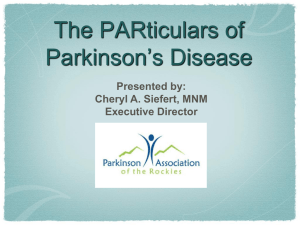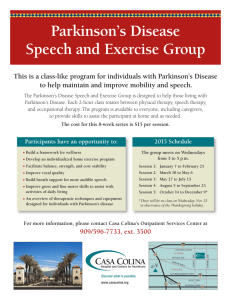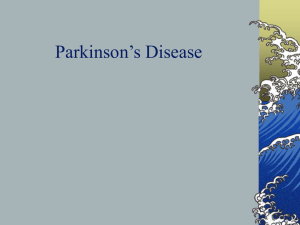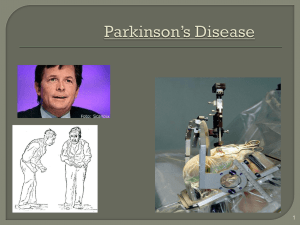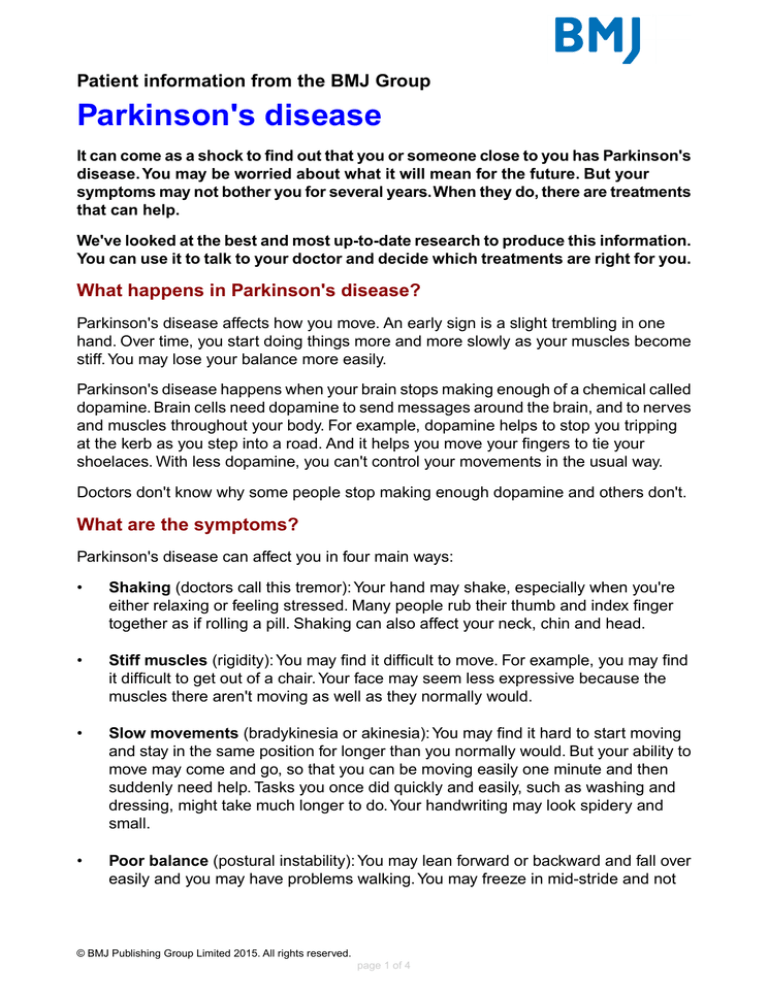
Patient information from the BMJ Group
Parkinson's disease
It can come as a shock to find out that you or someone close to you has Parkinson's
disease. You may be worried about what it will mean for the future. But your
symptoms may not bother you for several years.When they do, there are treatments
that can help.
We've looked at the best and most up-to-date research to produce this information.
You can use it to talk to your doctor and decide which treatments are right for you.
What happens in Parkinson's disease?
Parkinson's disease affects how you move. An early sign is a slight trembling in one
hand. Over time, you start doing things more and more slowly as your muscles become
stiff. You may lose your balance more easily.
Parkinson's disease happens when your brain stops making enough of a chemical called
dopamine. Brain cells need dopamine to send messages around the brain, and to nerves
and muscles throughout your body. For example, dopamine helps to stop you tripping
at the kerb as you step into a road. And it helps you move your fingers to tie your
shoelaces. With less dopamine, you can't control your movements in the usual way.
Doctors don't know why some people stop making enough dopamine and others don't.
What are the symptoms?
Parkinson's disease can affect you in four main ways:
•
Shaking (doctors call this tremor): Your hand may shake, especially when you're
either relaxing or feeling stressed. Many people rub their thumb and index finger
together as if rolling a pill. Shaking can also affect your neck, chin and head.
•
Stiff muscles (rigidity): You may find it difficult to move. For example, you may find
it difficult to get out of a chair. Your face may seem less expressive because the
muscles there aren't moving as well as they normally would.
•
Slow movements (bradykinesia or akinesia): You may find it hard to start moving
and stay in the same position for longer than you normally would. But your ability to
move may come and go, so that you can be moving easily one minute and then
suddenly need help. Tasks you once did quickly and easily, such as washing and
dressing, might take much longer to do. Your handwriting may look spidery and
small.
•
Poor balance (postural instability): You may lean forward or backward and fall over
easily and you may have problems walking. You may freeze in mid-stride and not
© BMJ Publishing Group Limited 2015. All rights reserved.
page 1 of 4
Parkinson's disease
be able to take the next step. (Doctors call this freezing of gait or FOG for short).
You may take quick, small, shuffling steps.
Parkinson's disease affects everyone differently. You probably won't get all of these
symptoms. And at first your symptoms will usually be mild. They tend to progress slowly
and in no particular order.
There are no special tests for Parkinson's disease. Your doctor will usually make a
diagnosis after talking to you about your symptoms and doing a physical examination.
Some people may have blood tests or a brain scan, usually to rule out other conditions.
It's important to keep track of your symptoms so that you can tell your doctor how they
have changed since your last visit. You might want to keep a diary of your symptoms to
show your doctor.
This information will help your doctor decide when you should start treatment and when
you need to change your treatment. If your symptoms are mild and don't bother you very
much, it may be many years before you get any treatment for Parkinson's disease.
What treatments work?
There's no cure for Parkinson's disease. But there are drug treatments that are used to
control symptoms.
Levodopa
The main drug used to treat Parkinson's disease is called levodopa. Levodopa is changed
into dopamine in your body. This replaces the dopamine in the brain that is lost in people
with Parkinson's disease.
You'll be given levodopa in combination with another drug. This may either be called
carbidopa (brand name of this combination is Sinemet) or benserazide (brand name
of the combination is Madopar). Carbidopa and benserazide help levodopa to work better,
so that you get fewer side effects and don't need to take as much of the drug.
Most people treated for Parkinson's take levodopa at some point. The drug can work so
well that your symptoms may clear up completely for a while. However you can get side
effects. Nausea, vomiting and sleep problems are the main ones. After about five years
levodopa can stop working so well, so that your symptoms come back between doses.
Also, about half of people get more serious side effects after about five years. The main
problem is abnormal movements that you can't control, such as head nodding, jerking
and twitches.Your doctor might prescribe a drug called amantadine to help control these
abnormal movements.
Because of the problems that can happen with levodopa, your doctor may try to delay
when you start taking the drug. For example, you may start on a different treatment first
and then switch to levodopa as your symptoms change or you get side effects. You may
also take other drugs together with levodopa to make it work better.
© BMJ Publishing Group Limited 2015. All rights reserved.
page 2 of 4
Parkinson's disease
Other drugs
You might be given selegiline or rasagiline if you have mild symptoms of Parkinson's
disease and these are getting in the way of what you do, but you're not ready to start
taking levodopa yet. Taking one of these drugs can help you move more easily and
reduce stiffness and shaking. They also have side effects, which can make you feel
anxious and dizzy.
Drugs called anticholinergics might also be used to help mild symptoms, before you
need to move onto levodopa. They work best at controlling shaking. Possible side effects
with these drugs include problems with your vision, a dry mouth, bladder problems and
constipation.
Another group of drugs called dopamine agonists might be used either before you start
levodopa, or at the same time as this drug, if it seems that it has stopped working so
well. Dopamine agonists work in the same way as dopamine in the brain. But they don't
work as well as levodopa at helping reduce the symptoms of Parkinson's disease. There
are lots of different drugs (apomorphine, bromocriptine, cabergoline, lisuride, pergolide,
pramipexole, ropinirole, rotigotine), all with different brand names. Dopamine agonists
can cause nausea, vomiting and sleep problems. If you feel breathless or get a cough
when you take one of these drugs, see your doctor.
If levodopa is not working as well as it used to, your doctor may give you a drug called
entacapone (brand name Comtess) or tolcapone (Tasmar) to take as well. These stop
levodopa being broken down by the body so the effects of levodopa should last longer.
Your symptoms should not come back between your doses of levodopa so much. You
might get jerking movements, nausea and vomiting with entacapone. If you get pale
stools, yellow skin or yellow eye whites when you take tolcapone, see your doctor.
Other treatments
You might benefit from getting some help from various therapists who are trained to treat
people with Parkinson's disease. A physiotherapist can advise you about exercises to
help you move more easily. An occupational therapist can help you to carry on doing
things that become harder because of Parkinson's disease. For example, you may get
advice on how to cope around the house or how to continue taking part in leisure activities
that you enjoy. A speech and language therapist can help you if you have problems with
your voice, speaking, or swallowing.
Surgery
Surgery to the brain might be an option for some people who have had Parkinson's for
a long time and for whom drug treatments no longer help. It can ease some of your
symptoms, especially stiff muscles, shaking and movements you can't control. But there's
no good research to say how long the benefits of surgery will last. It might be a year or
two, or longer. There are two main types of operation. One called lesioning destroys
the part of the brain that is causing symptoms.The other is called deep brain stimulation.
This involves having a device fitted in your chest. Wires from the device are fixed into
the part of the brain affected by Parkinson's. Electrical pulses from the device stimulate
© BMJ Publishing Group Limited 2015. All rights reserved.
page 3 of 4
Parkinson's disease
this part of the brain to reduce symptoms. You can talk to your doctor about whether
surgery would be a good option for you.
But it's important to remember that surgery cannot cure you of Parkinson's. And it won't
stop your disease from continuing. You'll probably need to keep taking drugs for
Parkinson's after surgery. We don't know how long the benefits of surgery last.
What will happen to me?
No one can say for sure what will happen to you if you have Parkinson's disease.
Everyone is different, and the way the disease affects you may be different from the way
it affects someone else.
Some people hardly notice their symptoms in the early stages of Parkinson's and lead
a full life for many years. But symptoms usually get worse as time goes by and the brain
makes less and less dopamine. For example, you might feel depressed, find it hard to
get to sleep or have problems speaking. You may need speech and language therapy
to help you adapt the way you talk, as well as drug treatments.
It's important to stay positive if you can. Take regular exercise and carry on doing the
things you enjoy. You might also want to join a support group for people with Parkinson's
disease. All these things can help you cope with your condition.
If you're caring for someone with Parkinson's disease, you may need support, too. If you
feel you can't cope or you get depressed, your doctor or another health professional may
be able to put you in touch with local support groups and organisations that offer help in
the home.
Where to get more help
Parkinson's UK can put you in touch with a group for people affected by Parkinson's
disease in your area. You can call the society's helpline (0808 800 0303) or check the
website (http://www.parkinsons.org.uk). It also provides help and information on all
aspects of the condition.
This information is aimed at a UK patient audience. This information however does not replace medical advice.
If you have a medical problem please see your doctor. Please see our full Conditions of Use for this content. These
leaflets are reviewed annually.
© BMJ Publishing Group Limited 2015. All rights reserved.
Last published: Sep 16, 2015
page 4 of 4

